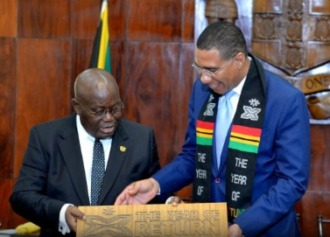When the United Nations General Assembly meets on October 29, Jamaica will again join more than 180 countries around the world that will ask the United Nations to condemn the United States economic embargo against Cuba.
The House of Representatives last Tuesday voted for Jamaica to use the stage at the U.N. to unequivocally declare its support for the lifting of the embargo.
It will be the 22nd consecutive year that Cuba will be using the floor of the UN to seek the lifting of the economic embargo.
Jamaica, last year, voted with 188 nations at the UN General Assembly condemning the embargo. Only the U.S., Israel and Palau supported the embargo.
Addressing the House of Representatives last week, Anthony Hylton, Jamaica’s industry, investment and commerce minister, pointed members to a Bloomberg report which said that from 2000 to 2006, the U.S. opened almost 11,000 Cuba sanctions investigations, versus almost 7,000 for all other countries combined.
Hylton noted that the U.S. last year imposed a US$619 million fine on Dutch bank ING for carrying out transactions with Cuba using United States currency.
ING, headquartered in Amsterdam, agreed to forfeit the money to the Justice Department and the New York County District Attorney’s Office for conspiring to violate the International Emergency Economic Powers Act and the Trading with the Enemy Act and for violating New York state laws by illegally moving billions of dollars through the U.S. financial system on behalf of sanctioned Cuban and Iranian entities.
Hylton said the fine, which is the highest imposed on a foreign bank for doing business with Cuba, indicates an intensification of economic measures of the blockade policy.
National Interest Affected
He told legislators that Jamaica’s national interest is adversely affected by the blockade imposed by the U.S., mainly due to the extraterritorial application of U.S. laws regulating transactions between Jamaica and Cuba.
Hylton noted that companies which do business with the Cuba using U.S. dollars, which is the currency of trade, are exposed to sanctions.
“The time is far gone when the (US) administration needs to yield to the voices, to the concern of the overwhelming majority of the international community,” declared Hylton.
Pointing, for example, at the Helms-Burton Act, Hylton said there is an urgent need for the removal of the blockade.
The Helms-Burton Act is a U.S. federal law which strengthens and continues the U.S. embargo against Cuba.
The act extended the territorial application of the initial embargo to apply to foreign companies trading with Cuba, and penalized foreign companies allegedly ‘trafficking’ in property formerly owned by U.S. citizens but expropriated by Cuba after the Cuban revolution.
The Cuban government has calculated that since the blockade was enforced in 1960 the total financial damage to the country’s economy is around US$3 trillion.
Last Tuesday, Opposition member of parliament (MP) and former foreign minister Dr. Ken Baugh told legislators that in order for the region to move forward, “we have to get rid of blockage against Cuba”.
Government ministers Phillip Paulwell and Horace Dalley also spoke in favor of lifting the resolution.
Read the entire article here.


